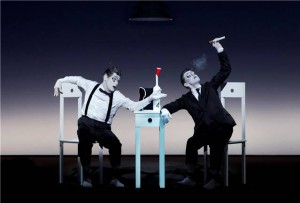Theatre review: The Old Woman
Article published: Sunday, July 7th 2013
The Old Woman, which previewed at the Palace Theatre last Tuesday, is an experimental piece of devised theatre based on a 1939 novella by Russian writer Daniil Kharms and adapted for the stage by Robert Wilson and Mikhail Baryshnikov.
The play deals with the duality of things and the mechanisation of life in modern times, but is also a testament to the human qualities that can bloom in the harshest of circumstances. It consists of two men (Baryshnikov and Willem Dafoe), looking somewhat like The Tramp-era Charlie Chaplins, as they dance, scream and cry on stage. There is no plot, scenes and dialogue are repeated over and over, and the set looks like something from Looney Tunes; all angles and bold colouring.
The actors regurgitate their lines, stripping them of meaning, altering inflection with each pass. Yet the silliness and experimentation with which they do this is very human. Their movements are sometimes slowed down into discrete steps, like in a work-flow diagram, while at other times they dance with beauty and continuity. The story seems to have no meaning, jumping from one moment of mechanical chaos to another, and yet it provokes an emotional and sometimes deep-felt response: a prime example of this was when the two actors embraced at snail-pace, in a tender clasp for comfort and love.
Theatre like this is challenging; it wants you to reject it. By repeating, intruding and generally annoying, The Old Woman tries to break down your defences and make you react to it in a visceral way, but this provocation causes you to be drawn in.
Experimental theatre is never going to be perfect, but it should inspire new ideas and thoughts. In The Old Woman the clash of human and mechanical qualities does just this, making it a worthwhile, rather than simply annoying, experience.
Andrew Anderson
The Old Woman is being performed as part of Manchester International Festival and continues at the Palace Theatre until 7 July.
Comments
No comments found
The comments are closed.




